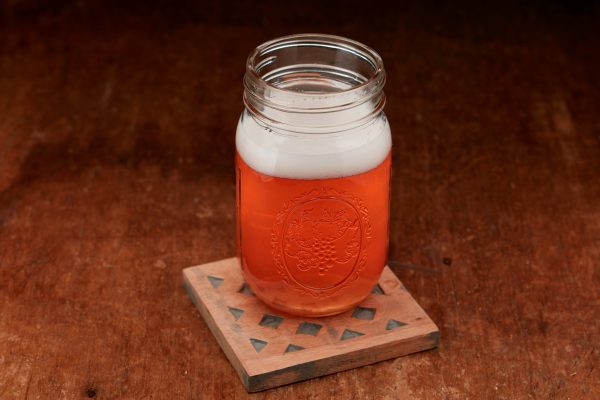
By Drew Beechum
With but a little twist I think we can fit the classic anthem of “Yo ho! Yo ho! A pirate’s life for me” to the typical modern homebrewer. Admit it, you carry a little of that piratical “damn the man who’ll tie me to the yoke” attitude with you right now.
Hopefully, our clubs and organizations continue to grow despite our best, unorganized efforts, but with that growth comes a cost. What happens the day you want to host a club party, but don’t have a member with a large enough yard? What about renting a bus? Writing checks? Receiving checks? Sadly, our modern financial, commercial and banking institutions eye with suspicion the dissolute lifestyle we lead (in their eyes, at least). Even government parks nervously twitch when you tell them you’re with a beer club.
To gain the respect or at least a less jaundiced eye toward our “irresponsibility,” it becomes necessary to join the system and appear respectful enough to at least be organized officially and “shielded” from liability. Nothing makes a bureaucrat relax as much as proper paperwork and tax forms. It proves to them you’re a serious adult.
A note of warning before we get too far along: This article is based upon our experiences and we can only speak with clarity about them with regard to our locales (California and Texas). Realize that your state, county, city or HOA may enforce different rules. If you have any doubt, consult a local attorney for advice about what obligations and expectations you’re facing. Actually, you should consult a local attorney and CPA regardless. Take a look through your club roster; you may pleasantly discover that you have those professions represented internally. As an added bonus, you won’t have to have the whole “moonshining” discussion yet again.
Why “Get Real”?
For us, it was all about the respectability and shielding. When my club, the Maltose Falcons, began to first incorporate, we were running a then-large competition, adding members rapidly, and taking in large enough amounts of cash that made it feel like we were big fishes in a tiny pond. The numbers aren’t important, but that sense of encroaching doom is.
With appropriate steps taken, your club can find that things are easier to do—getting business checking, for instance, typically requires having a tax number (read ahead for the federal steps for that), charters and official minutes announcing who’s officially in charge.
Charter Membership
The first step to getting that burnished glow of legitimacy is to create a club charter. Think of it as your club’s constitution and the laws by which you run the whole deal. In general it doesn’t have to be long and full of obtuse language that hinges on the placement of commas. What you do need to state is your club’s purpose and general makeup of the organization, including its scarily official “board.”
By the way, this is an excellent opportunity to employ a little creative borrowing. The Maltose Falcons are on our second set of bylaws. The original bylaws were created by R. Bruce Prochal and Maureen Nye from a birding society’s bylaws. There is very little mechanically different from enthusiast society to enthusiast society except the focus. We meet, we gather dues, we engage in our favorite activity, we talk about it, we proselytize to the masses (who may think we’re nuts), etc. They just happen to tick different styles of birds while we tick different styles of beer.
Your bylaws should reflect how you conduct business. Stringing together a set of words that relate little if at all to your actual practices may come back and bite you in the butt. Remember, all it takes is for one official to decide that you’re running a scam for you to land in a heaping world of hurt or at least confusion.
For our example of bylaws, please see: http://www.maltosefalcons.com/about/bylaws
Incorporating?
Astute readers may have noticed that I didn’t talk about incorporating the club. Corporations are handy legal constructs that in theory shield a board of directors from legal action, but they come at a cost. States expect to be paid taxes for the right to exist as a legal person. And until you get the hang of it, filing all the appropriate paperwork and paying the right fees is a morass that doesn’t seem to be worth the effort.
An exception should be made for the big things, like for instance the Bluebonnet Brew Off competition. The 2010 competition handled more than 1,600 entries and is the work of several clubs. Not only is it a competition, but with a tech presentation, keynote speaker and Pub (and Room) Crawl, it’s an event. At that point, with real money on the line, it becomes worth the hassle to protect everyone involved.
Becoming Federally Organized
With the passage of the 16th Amendment in 1913, Congress wasted no time enacting a broad, progressive income tax system. What’s deemed taxable income has fluctuated since the passage of the Revenue Act of 1913. The 1916 Revenue Act added special exemptions for qualified non-profit organizations. Included in the mix of churches, social welfare leagues, retirement funds and credit unions is type “501(c)(7) – Social and Recreational Clubs.” Normally, this means groups like your local swim club or R/C plane group that runs a field. For us, this means our local band of misfit fermentation explorers. The justification for this exemption lay in the relative difficulty of tax collection and the paucity of return.
The general idea is to make it practical for all of us to join together (or in Federalese “commingle”) and pool our funds without double taxation. To keep the feds happy, the exemption has very specific needs that must be met:
- There must be a charter that defines the organization as a trust, corporation or association. (See above)
- The organization must have an Employer Identification Number (EIN). You can fill out the form SS-4 or apply online
- There must be a body of members that commingle for recreational or social purposes. (i.e. in our case, meeting regularly to drink and brew beer).
- The majority of the club’s income must come from the membership dues and fees (minimum 65 percent) and not from non-members’ usage of club materials and facilities.
- Club activities must be of a substantially recreational nature. (i.e. no offering insurance to your members for a fee)
- Other clubs may be a part of a “super club” only in cases where there are a number of distinct individual members.
- Status can also be revoked if at any time during the year, the organization’s charter contains provisions that discriminate against any federally protected status (e.g. gender, race, religion, etc.)
- All organizations must file an annual copy of the short IRS Form 990-N to certify their not-for-profit status. As long as your club’s proceeds total less than $50,000 per year from the membership dues and fees, you’re in the clear. Pass that threshold and the IRS will want the longer form that more clearly delineates club proceeds.
- Note that proceeds from things like donations, raffles, auctions, etc. are not considered exempt income and may leave your club on the hook for a tax bill.
Once you’ve got these ducks in a row, you’ll need to fill out IRS Form 1024 and submit it to the IRS. Eventually you should be notified that all is right in the world and you are now legally a tax-free group. While awaiting official approval, you can in good faith act as a non-profit. I know it seems like an absurd number of hoops to jump through, but in terms of governmental signoff on not collecting taxes, this is easy and every club should do it.
You’ll also want to check with your state as most will recognize a 501(c)(7) organization, but they’ll have another set of hoops to get their tax number.
Words of warning to your members—donations to the club, dues, etc. are not tax deductible!
Liability
This is the big one. None of us want any of our homebrewing companions to get into serious trouble, not only because we’re moral and decent people, but because of the Sword of Damocles that hangs not only over the club, but over all those involved in the organization, especially the club’s leadership.
Before you run scared from ever serving on your local club’s board, please know that a quick trolling showed no recent lawsuits in California involving homebrewing clubs. But that doesn’t mean we’re free and clear as hosts. Clubs should take reasonable precautions to prevent stupid behavior on the part of our members. Thankfully, most of our members are responsible enough to behave. Here are a few things we do:
- Membership cards contain a basic waiver and agreement that the member will behave in a responsible manner with understanding that poor behavior may result in termination of membership
- Tapped kegs are poured inside our clubhouse where the meeting is active to encourage members’ attention and discourage “dash and drink” behavior.
- Members list their beers on the wall and we allow each member a few minutes to talk about his or her beer, take questions and comments while the beer is served. This discourages bottle sharing and lends an educational air to the tasting.
- Free drinking water is always available.
- Food is served before the main round of sampling homebrews commences.
- At all of our festivals, designated drivers get a discounted ticket and camping is included in the price of all tickets.
For when these basic steps just aren’t enough, it’s time to break out the big guns and go looking for liability insurance. There are two primary forms of liability insurance to worry about: event and general liability. Much of what our clubs do center on events, so a single event insurance policy is a good consideration for anyone running a major event. In general, prices for coverage run in the upper hundreds for small events. While not cheap, many larger and better venues won’t allow a beer event without it and you’ll be much more relaxed.
Affordable general liability insurance or at the very least insurance that protects board members from liability is a long standing goal of the AHA. The hope would be to provide coverage for a fee that is reasonable to most large clubs. At this point, the AHA is still exploring its best options.
Next Steps (How You Can Help!)
Now here’s the part where the AHA could use your help. In this article we’ve made a number of suppositions and provided you with the best of our current knowledge, but we’re not experts. If you have experience with liability insurance or a better understanding of legal or tax liability stemming from a club’s activities, we’d love to gather your knowledge together for the membership. Drop AHA director Gary Glass a line to volunteer!
Drew Beechum is a regular contributor to Zymurgy as well as a member of the AHA governing committee. He lives in Pasadena, Calif. and has apparently been spending too much time on the Pirates of the Caribbean ride at Disneyland.





Share Post